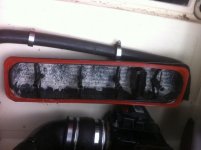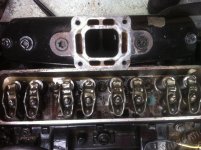Step 1. Remove valve covers, inspect rocker arms and see if any are extremely loose as compared to the rest or broken or not sitting on the valve or push rod. If they all look ok then see if ALL rocker arms are moving and are moving about the exact same amount with engine idling. There will be oil running down so have a lot of rags and KEEP YOUR HANDS OUT OF/AWAY FROM THE MOVING PARTS
If any are not then that will be your issue.
If all looks good on the rocker arm assembly then the issue may be within the engine deeper then there is no way to tell exactly without removal and disassembly.
Everything else is just a guess.
You are looking for an answer to a YOUTUBE video from the internet vs being there and listening to it first hand with a stethoscope to try to pinpoint the sound.
Also what is the history on this engine?
Has it ever overheated?
Is it original or a rebuilt?
WHat other issues if any have you had that were mechanical in nature?
Trying to pinpoint a possible cracked piston from a video and the sound is 1000% impossible.
You could have spun a bearing on a connection rod, you could simply have a failed piston slapping the cylinder walls, or a number of other issues.......
Only way to tell once the valve train has been eliminated it to pull it out of boat and pull it apart........
Thanks for taking Your time.
Took out valve covers, all assembly seems ok, didn't run the engine, because exhaust elbow was already removed.
The only thing I didn't like is that white/grey mess, which indicates water. I've noticed that earlier, and thought it's condensate, cause oil on the dipstick, stays where it was. (a bit too much, but stable). Now I've noticed, that water canal on the head is a quite heavily rusty, and possibly gasket doesn't hold there well. I don't know if some water gets into cylinders via intake, could that be related to noise?
History of the engine is not bright. I've bought it as rebuild, but as later figured out- poorly.
The problems I had with it was constantly braking valve springs, and of course bending valves. So I changed all springs recently (old springs had deep rust), did valve job.
I'm planning to tear this engine till last screw and rebuild it with care this winter, but now I have one more month to enjoy.



